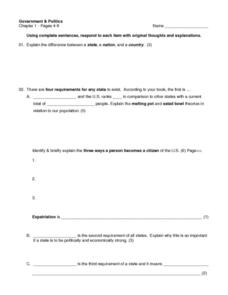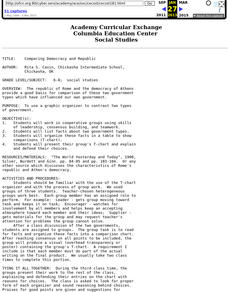Curated OER
Defined: The Different Types of Government
The world is a big place, so it only stands to reason that different forms of government exist. Democracy, autocracy, oligarch, monarch, and dictatorship are all defined. An extensive explanation of US government system is also included....
Curated OER
East Asia Country Project
Get your young historians thinking about East Asian culture and history during this partner research project, in which they analyze a variety of East Asian aspects to prepare for a presentation. After an initial "what do we already know"...
Curated OER
Creating a Government
A simulation gives scholars a personal look at what goes into forming a government. Each of them is assigned 1 of 4 tribes which make up Borka, a hypothetical country. The tribe distribution is based on the percentage of people in each....
Curated OER
Types of Government
Students explore different types of government. In this government lesson, students discuss the role of government in modern society, identify different types of modern governments, and play a game based on the information gleaned from...
Curated OER
The Economy and Politics
In this economy and politics sociology worksheet, students complete 14 fill in the blank questions and 7 multiple choice questions regarding the how businesses operate in different economies and under various political control.
Curated OER
Government & Politics: Chapter 1
In this United States history learning exercise, students reference their textbook to answer 18 fill in the blank questions and 8 short answer questions regarding different types of government.
Curated OER
Comparing Democracy and Republic
Students use a graphic organizer, a T-chart, to contrast two types of government. They list facts about the two governments, and explain and defend their choice of facts to include.








